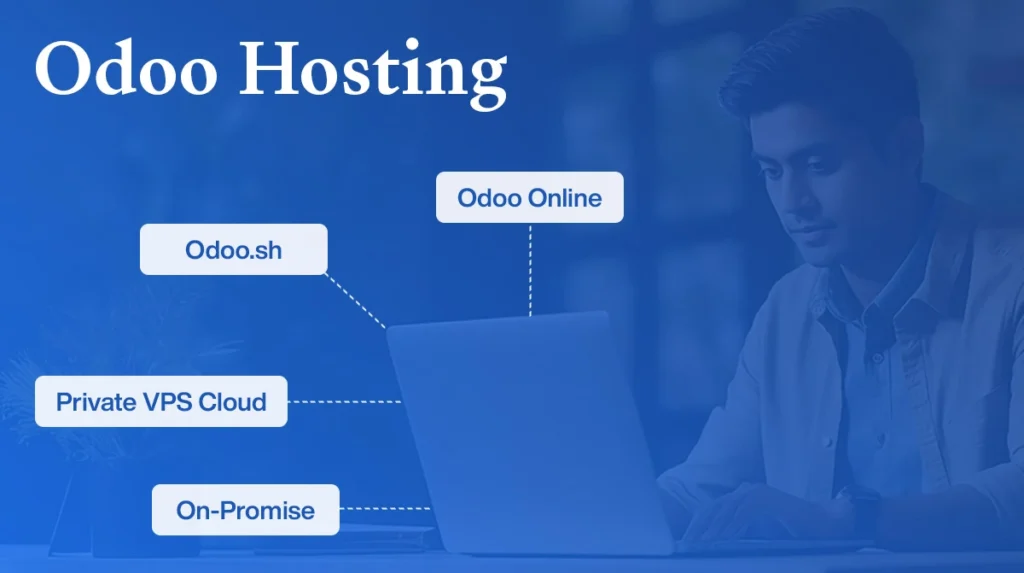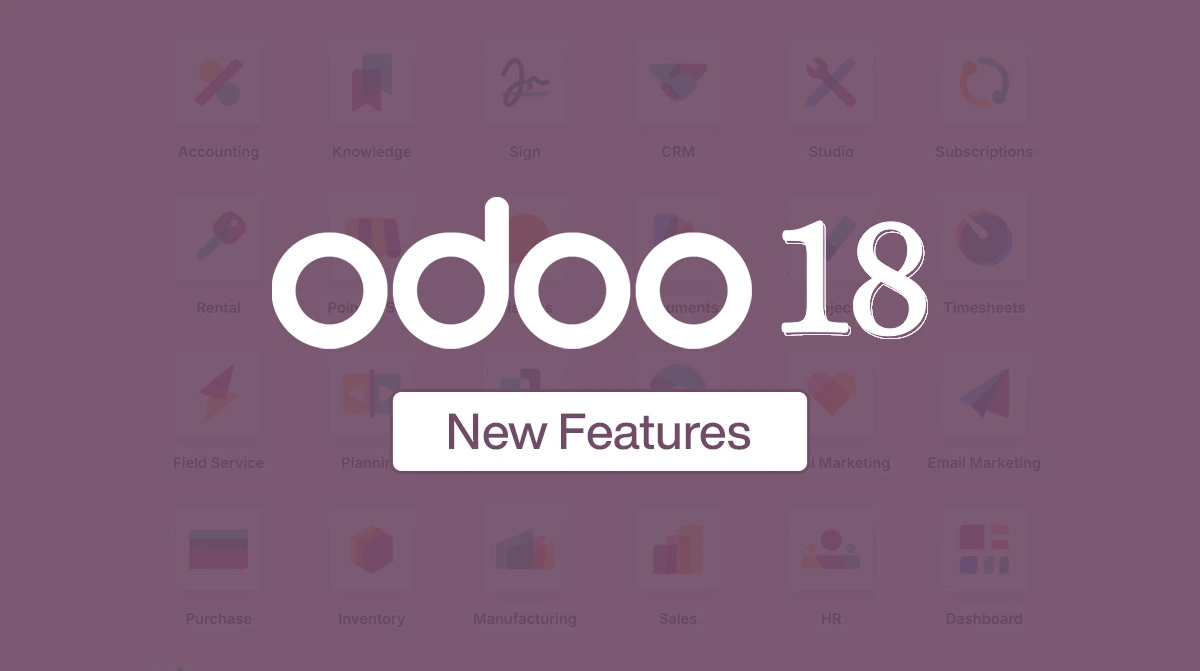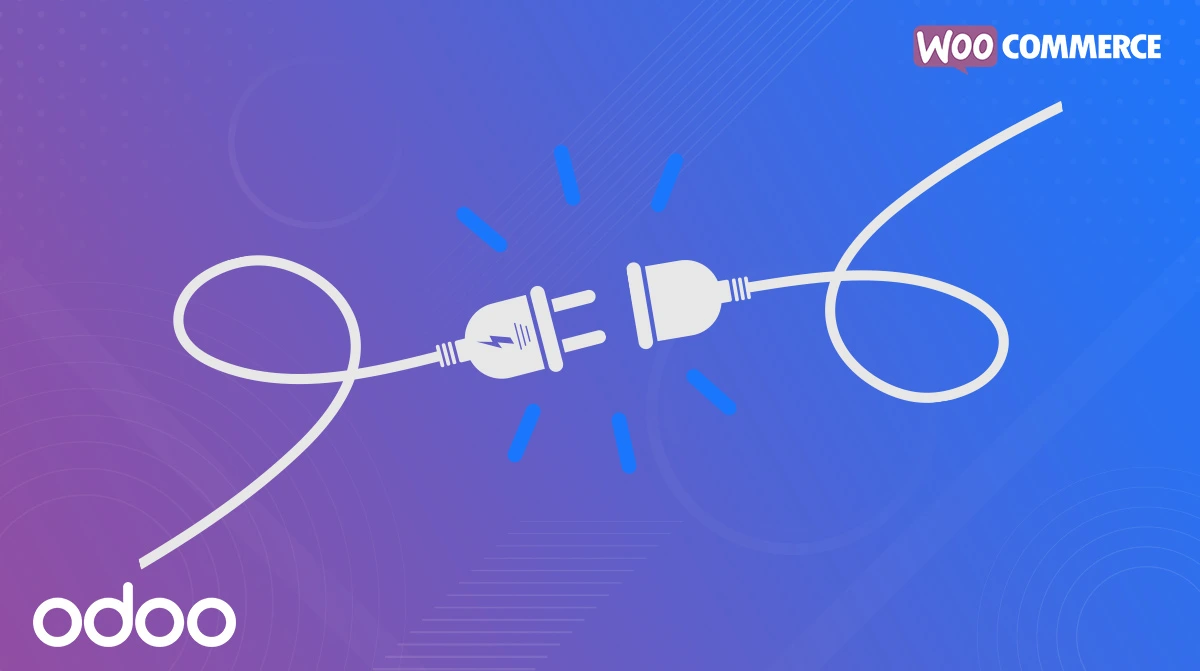Are you looking for an Odoo hosting to implement in your legacy systems?
If yes, you’re not alone in embracing this powerful ERP! Odoo is an all-in-one business management software that helps streamline everything—from sales and inventory to accounting and CRM.
It’s a premier ERP suite offers up to 99.99% uptime, allowing you to streamline different aspects of your operations in no time. Think of it as a Swiss army knife for businesses, offering a wide range of integrated apps that grow with your needs. Whether you’re running a small store or a large enterprise, Odoo makes managing operations smoother and more efficient.
However, like other software, Odoo implementation has a few aspects, primarily its hosting. Therefore, in this blog, we will examine the different aspects of Odoo hosting in the following sections.
Importance of Hosting for Odoo
Choosing the right hosting for Odoo is like giving your car the perfect fuel—it ensures peak performance and smooth functioning. Hosting directly impacts the speed, security, and reliability of your Odoo applications. A poor hosting setup can lead to slow performance, downtime, or even data loss. For businesses, having a dependable hosting environment means uninterrupted workflows and satisfied customers.
When it comes to hosting Odoo, you have a few options: cloud hosting, on-premises servers, or dedicated hosting providers specialized in Odoo. Each option has its perks. Cloud hosting offers scalability and flexibility, while on-premises servers give you complete control.
Meanwhile, specialized Odoo hosts handle everything, from maintenance to security, letting you focus on your business. The key is to pick what fits your business needs and growth goals.
Types of Odoo Hosting
Choosing the right hosting option for Odoo can significantly impact performance, maintenance, and cost.
In this section, we’ll explore two major types of hosting, On-Premise Hosting and Odoo Cloud Hosting, along with their pros and cons. We’ll also break down the differences between the Odoo Hosting Types: Online and Odoo Community, to help you make an informed decision.
On-Premise Hosting
On-premise hosting means installing and running Odoo on your own servers in your office or a dedicated data center. This setup gives you complete control but also comes with specific responsibilities.
Benefits of On-Premise Hosting
- Full Control:
You have complete control over hardware, software, and system configurations. - Customizations and Integrations:
On-premise hosting offers flexibility for advanced customizations, which may be limited in cloud environments. - Security and Privacy:
Sensitive data stays within your internal systems, which is critical for companies with strict data compliance requirements. - No Ongoing Subscription Costs:
Apart from hardware and initial setup expenses, you can avoid recurring cloud hosting fees.
Considerations for On-Premise Hosting
- High Initial Costs:
Setting up servers and infrastructure requires upfront capital investment. - Maintenance and IT Expertise:
You need a dedicated IT team to manage software updates, backups, and server security. - Scalability Challenges:
Scaling up requires adding more hardware, which can be time-consuming and expensive. - Downtime Risks:
Your business operations may be interrupted if your hardware fails or your local network goes down.
Read More: Odoo Community or Enterprise: Which Offers the Best Value for Your Company
Cloud Hosting
Cloud hosting allows you to run Odoo on third-party cloud servers. This approach reduces the need for in-house infrastructure and offers more flexibility.
Overview of Cloud Solutions
Cloud hosting involves using providers like AWS, Microsoft Azure, or Odoo’s cloud platform. The provider manages the infrastructure, and you access your Odoo instance remotely. You can opt for Odoo Online (Odoo’s SaaS platform) or self-host Odoo Community on a Cloud Service of your choice.
This solution is ideal for businesses seeking rapid scalability and minimal maintenance.
Benefits of Cloud Hosting
- Lower Setup and Maintenance Costs:
There’s no need to buy servers or hire IT staff. The cloud provider handles infrastructure management. - Easy Scalability:
Increase or decrease resources based on your business needs without purchasing new hardware. - 24/7 Uptime and Redundancy:
Cloud providers typically offer multiple data centers, ensuring minimal downtime and data loss. - Accessible Anywhere:
Since it’s hosted online, you can access Odoo from any location with an internet connection. - Automatic Updates:
Cloud platforms often offer automated updates and backups, reducing maintenance efforts.
Odoo Online vs. Odoo Community
When choosing Odoo in the cloud, you can opt for Odoo Online or host the Odoo Community version on a cloud platform. Let’s break and understand the difference between the two options:
Key Differences
- Odoo Online:
A Software-as-a-Service (SaaS) offering from Odoo, where hosting and updates are managed by Odoo. It includes only specific pre-installed modules and is subscription-based. - Odoo Community on Cloud:
A self-hosted, open-source version with more customization freedom. You can install it on any cloud provider, such as AWS or Google Cloud, but you’ll need to manage maintenance.
Use Cases
- Odoo Online:
Best for small to medium-sized businesses that need a quick, hassle-free setup with minimal customization. - Odoo Community on Cloud:
It is ideal for larger businesses requiring advanced customizations and integrations, as it offers more flexibility and control. However, maintenance requires IT expertise.
Read More: Odoo VS SAP: Everything You Need to Know
Factors to Consider When Choosing Odoo Hosting
When selecting the right hosting provider for Odoo, assessing multiple factors is important to ensure your business operations run smoothly. Here’s a breakdown of the key elements to focus on:
1. Performance and Scalability
- Fast Load Times: A hosting service with optimized servers ensures that your Odoo platform loads quickly, enhancing the user experience.
- Scalability for Growth: As your business expands, the hosting should allow easy upgrades to handle more users and data without downtime.
- Uptime Reliability: Look for providers that guarantee 99.9% uptime or higher to avoid disruptions.
2. Security Features
- Data Protection: Your hosting provider should offer features like daily backups and encryption to protect your business data.
- Firewall and DDoS Protection: Ensure the provider has robust defenses against cyberattacks to secure your system.
- Compliance: If your industry requires it (like GDPR or HIPAA), the hosting must meet those regulatory standards.
3. Support and Maintenance
- 24/7 Customer Support: Quick support availability helps resolve issues before they affect your business operations.
- Managed Hosting Options: Some providers handle updates, backups, and server management so you can focus on your business.
- Knowledge Resources: Providers with documentation, forums, or tutorials make troubleshooting easier.
4. Cost Considerations
- Transparent Pricing: Look for clear plans with no hidden fees for upgrades or support.
- Pay-As-You-Go Models: Flexible pricing structures help avoid unnecessary costs if your business grows.
- Long-Term Value: Consider the features you get for the price to determine if the provider offers good ROI.
5. Location of Servers
- Geographical Proximity: Servers closer to your target users reduce latency and improve performance.
- Data Residency Laws: Some countries have regulations about where data can be stored—check if this applies to your business.
- Global Network Availability: A hosting provider with data centers worldwide can ensure consistent performance if you serve multiple regions.
Setting Up Odoo on Different Hosting Platforms
Setting up Odoo, whether on the cloud or a local server, can impact how smoothly it runs for your business. Below is a breakdown of how to set up Odoo on Amazon Web Services (AWS), Google Cloud Platform (GCP), and a local server with best practices to ensure smooth deployment.
1. Amazon Web Services (AWS) Setup
AWS is one of the most popular platforms for hosting Odoo due to its scalability and flexibility. Here’s how to get started:
Setup Guide
- Step 1: Log in to AWS Management Console.
- Step 2: Launch an EC2 instance (Ubuntu or Debian recommended).
- Step 3: SSH into the instance and install dependencies (Python, PostgreSQL).
- Step 4: Download and install Odoo from GitHub or Odoo’s repository.
- Step 5: Configure Odoo, set up the database, and ensure it’s accessible through your firewall.
Best Practices
- Use Auto Scaling to manage high traffic.
- Enable AWS Backups (using EBS snapshots) for disaster recovery.
- Utilize CloudWatch to monitor server health and performance.
- Restrict access with security groups and SSH keys.
2. Google Cloud Platform (GCP) Setup
GCP is another great choice, offering a reliable and secure environment for Odoo. Here’s how to deploy it on GCP.
Setup Guide
- Step 1: Open Google Cloud Console and create a VM instance.
- Step 2: Choose a Linux image (Ubuntu/Debian) and customize the machine type.
- Step 3: Connect via SSH and install Odoo’s dependencies (PostgreSQL, Python).
- Step 4: Download and install Odoo, configure the database, and make it accessible over HTTP.
Best Practices
- Use Cloud SQL instead of managing your own PostgreSQL database.
- Set up Cloud Monitoring to track resource usage.
- Create regular snapshots for VM backups.
- Use IAM roles to control user access to resources.
3. Local Server Setup
Setting up Odoo on a local server gives you more control but requires more management. Here’s how to handle it effectively:
Requirements
- A dedicated machine with at least 4GB RAM and dual-core processor.
- Install a Linux OS like Ubuntu or Debian.
- Ensure Python 3.x and PostgreSQL are installed.
Step-by-Step Guide
- Update the system: sudo apt update && sudo apt upgrade.
- Install PostgreSQL: sudo apt install postgresql.
- Add Odoo’s repository and download Odoo:
bash - Install Odoo: sudo apt install odoo.
- Configure the firewall and ensure the service is running:
sudo systemctl start odoo.
Performance Optimization for Odoo Hosting
Optimizing Odoo’s performance ensures your business runs smoothly, avoiding slow loading times and system lag. Here are practical tips to enhance its speed and efficiency:
Tips for Improving Odoo Performance
- Update Regularly: Odoo and modules are updated to the latest versions to leverage performance patches.
- Limit Unused Modules: Disable or uninstall unnecessary modules to reduce resource consumption.
- Monitor Resource Usage: Regular monitoring helps you identify bottlenecks before they affect performance.
Caching Mechanisms
- Enable HTTP Caching: Store frequently accessed data to reduce server load and improve response times.
- Redis or Memcached: Implement these caching systems to speed up data retrieval and minimize database queries.
- Use Query Results Cache: Cache expensive SQL queries to prevent repeated execution.
Load Balancing
- Distribute Traffic Across Multiple Servers: Use load balancers like Nginx to prevent one server from becoming overloaded.
- Implement Horizontal Scaling: To maintain smooth performance, add more servers during peak traffic periods.
- Session Persistence: Ensure sessions stick to specific servers to avoid disruptions in user experience.
Database Optimization
- Database Indexing: Index frequently queried fields to speed up searches.
- Regular Cleanup: Remove unused data, logs, and temporary files to keep the database lean.
- Connection Pooling: Use pooled connections to reduce the overhead of frequent database connections.
Security Best Practices for Odoo Hosting
Keeping your Odoo Hosting Service environment secure is essential to protect sensitive business data and ensure smooth operations. Here’s a breakdown of key practices:
1. Data Encryption
- Use SSL/TLS certificates to encrypt data in transit, ensuring safe communication between users and the server.
- Encrypt stored data, especially for backups, to prevent unauthorized access even if compromised.
2. Firewall Setup
- Implement a firewall to block unauthorized access to your Odoo Server Administration Services.
- Use IP whitelisting to allow only trusted IPs and services to interact with your system.
3. Regular Backups
- Automate backups on a daily or weekly schedule to prevent data loss.
- Store backups in multiple locations (e.g., cloud and local storage) to ensure easy recovery in case of failure.
4. User Access Control
- Grant role-based access to users, limiting their permissions to only what they need.
- Regularly review and update user access levels to prevent misuse or outdated permissions.
Read More: 8 Reasons Why Odoo Is the Most Secure Platform According to OWASP
Monitoring and Maintenance of Odoo Hosting
Ensuring smooth performance for your Odoo Reliable Hosting Solutions requires ongoing monitoring and regular maintenance. Below are key areas to focus on to keep everything running efficiently.
Tools for Monitoring Odoo Performance
- Performance Dashboards: Use Odoo’s built-in dashboards to track key metrics like CPU usage, memory consumption, and response times.
- Third-Party Monitoring Tools: Solutions like Prometheus or New Relic help you monitor deeper infrastructure metrics and set alerts.
- Logs and Reports: Review server logs regularly for signs of latency or errors and generate reports to stay ahead of performance bottlenecks.
Regular Maintenance Tasks
- Database Optimization: Run database cleanups and remove obsolete data to ensure optimal speed.
- Module Updates: Regularly update Odoo modules and patches to avoid security risks and bugs.
- Backup Management: Automate backups to prevent data loss in case of failures.
Troubleshooting Common Issues
- Slow Page Loads: Check server load and optimize queries.
- Module Conflicts: Disable conflicting modules and test configurations.
- User Login Issues: Clear browser cache and verify user roles or permissions.
Conclusion
In summary, selecting the right hosting option is crucial for your business’s online success. When deciding, consider critical factors like performance, scalability, and support.
You must weigh all the Odoo hosting options to select the best one. Remember, every hosting platform has various capabilities, so you may carefully define your unique needs before selecting one.
Choosing the right host can set your business up for long-term growth and stability, so take the time to find what best suits your needs.
Related Articles
-
Odoo 18 Highlights: Everything You Need to Know!
Odoo has always been a significant player in ERP (Enterprise Resource Planning) solutions, providing businesses a platform to manage their operations more effectively. With its Odoo 18 release, the ERP
-
A Comprehensive Manual for Streamlining the Transfer of Financial Data Between SAP and Odoo
In this digital age and fast-paced corporate world, agility and flexibility are critical to keeping ahead. ERP systems help organizations simplify their processes. However, when firms expand and adapt, their
-
The Ultimate Guide to Odoo Connectors for Seamless Integration
Odoo is a free and open-source enterprise resource planning (ERP) system with a modular architecture and several business apps. These apps include eCommerce, customer relationship management (CRM), accounting, manufacturing, and




